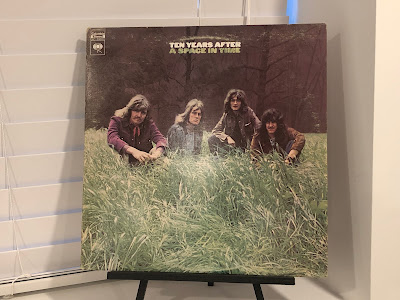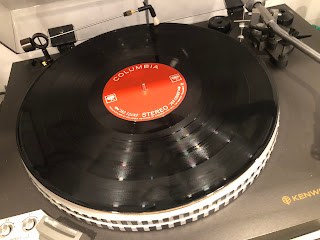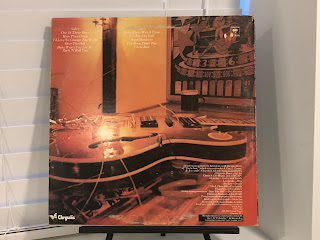This was the album I really wanted to find, so finding it was a real treat. This was still Ten Years After, rooted in their amped up 12 bar blues, but this time out the band had expanded their colour palate and featured strings and acoustic guitars interwoven with Alvin's blistering fretwork.
Six albums in and the band line up was the same here as it was on their debut. All four guys seemed to bring their best to the table on this one. Alvin Lee on guitar, vocals, Leo Lyons on bass, Ric Lee on drums and Chick Churchill on keyboards. There was still a lot of hippy dippy meandering shit to wade through here and there which was good fun. I love this era for that carefree seemingly loosely structured jams that were actually intricately assembled to give the feeling they were thrown together.
A little side note about the record I found. I'm guessing this was misprinted copy as my side A doesn't have anything on it other than the generic Columbia centre label. I doubt this is of any importance, but I always get a kick of of stuff like this.The album opens with "One of these Days" and while it's a song that has definitely grown on me, the first couple of time it felt like generic noise to me, and the vocal effects didn't really help the song, but it was probably pretty crazy sounding at the time. I really started paying attention when "Here They Come" came on. This was much more subdued and was centred on the acoustic guitar, and set the stage for "I'd Love to Change the World" a song that combined a wonderfully understated acoustic riff, and Alvin Lee's frenetic lead work that was front and centre weaving around the music. Ric Lee's drumming gently and sometimes not so gently pushed the song along. This is followed by yet another acoustic song, "Over the Hill" that incorporates strings giving the song a sense of grandeur. The first side closes out with with a Chuck Berry inspired rocker "Baby Won't You Let Me Rock 'n' Roll You" that clocks in at hardly two minutes. Honestly it feels like a throwaway.
Flipping it over, the second side starts with "Once There Was a Time" another acoustic flavoured foot stomper, that puts the band firmly back into familiar their blues rock territory. I don't mind this kind of stuff, but there really wasn't much to songs like this, and the whole British Blues vein had been heavily mined by this time, and it was adapt or die. Churning out another blue based jam was getting a little old. Yeah I know I'm spewing this shit like I'm some wise old sage who was actually all of eight years old when this came out, and somehow during the intervening five decades and change I've somehow gained the ability to be a retrospective genius who can state the obvious like it's some great insight. However, songs like "Hard Monkey" where the band is blending rock and acoustic guitar around a driving groove is pretty cool and is what I had always associated with Ten Years After. Never having heard these songs they're pretty great. This continues on "I've Been there Too" another really solid song. The album ends with an short musical jam titled "Uncle Jam" that has the band riffing on an almost jazz like shuffle and Alvin is dialed back playing clean and crisp.
Like I said this is the album I had been looking for, and I'm actually kind of glad I started with a couple of their earlier albums as they did set the stage for the for A Space in Time. For those fans who were into the jam and bluesy side of the band, the opening cut was vintage Ten Years After and by the time they pulled out "I'd Love to Change the World" is wasn't a jarring change of pace, just another facet of the band.
Of course this is me just sitting in my chair being all hoity-toity and pretending like I have some great insights into an album I'd never heard until now. More than likely the band had no idea how the songs had been sequenced and that was done by the mastering engineer trying to get the most of out the albums dynamics and placing them where they sounded best with the most room to breathe. Or not.Does it matter?
Space in Time is a great album, even if I finally got to it more than Fifty Years Later.



Comments
Post a Comment